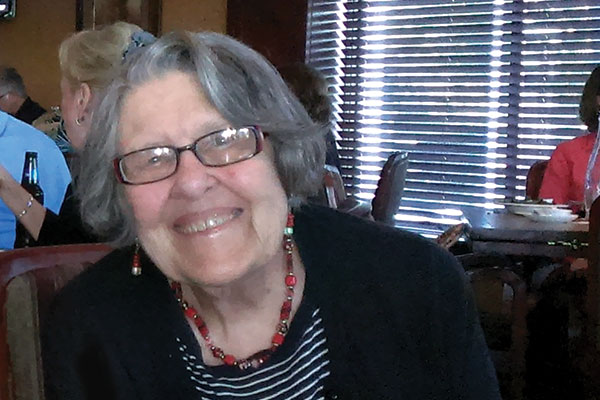I’m Not Dead Yet
by Ann Rein
Katie Suss, who is 15 and has a nice voice and a long history of theatrical camps, said I needed a theme song and she had just the one for me: “I’m Not Dead Yet” from Spamalot.
Those who had heard of my history with hospice agreed with the appropriateness, if not the propriety. With devastating diarrhea, dehydration, and loss of kidney function – the byproducts of chemo for colon cancer – I had been sent to St. Vincent’s Hospice on Payne Road to breathe my last. The St. Vincent’s doctor who explained it outlined a dire, hopeless scenario. I was convinced I was a goner, as did those friends who heeded email warnings that if they wanted to see Ann Rein, they had better hightail it to Payne Road.
Actually, I got better and in a couple of days was joining the party. It was not really a party, just visitors exchanging reminiscences, stories, and laughs. My daughter Mary called it “Ann Rein’s Farewell Tour.”
Ann Rein’s Farewell Tour seemed in keeping with the first meeting I had with an oncologist. I told him I was in my 80s, too old for a fight to eliminate cancer from my body. He caught my unexpressed thought: let the cancer run its course, but keep me feeling good. He suggested we could try “something gentle.” After duly responsible tests and surgery to remove a section of my colon, along with a tumor, he started me on chemo infusions that, after we got rid of some pesky diarrhea-causing pills, kept the cancer markers low, me feeling good, and him muttering, “Amazing!”
There was a troubling missing piece in my plan to move home: people (not anybody paying my bills) thought I should have someone staying with me at night.
After about a year and a half, the amazing chemo stopped being so effective. It was time to switch to another. That one listed diarrhea as a side effect, and the manufacturer’s literature did not fib. It also listed hair loss, again no lie. It was gone in two weeks. It became clear that there was no reason to continue the treatments and, therefore, I no longer qualified for the curative services of Medicare. I became a hospice patient. Hospice is pleasant. The aim is to provide everything you need for comfort, even before you know you need it. One of the nicest perks is a nurse who comes once a week and takes as long as needed to discuss (even research) my questions and check me out. During the years my husband, a double amputee, was in a wheelchair, I opined that geriatricians should have caretakers’ phone hours just as pediatricians had mothers’ call-in hours. This nurse is even better.
St. Vincent’s Hospice on Payne Road is a lovely place with skilled, caring staff, but if you are getting healthier, you cannot stay. I needed to go somewhere. I was not ready for home, or home was not ready for me. The default solution for continuing hospice care was Marquette’s Health Center. Problem: there was not room for me on the first floor, so I had to go the second. I murmured that I thought the second floor was for those who would never be going home again. I was assured it was about half and half. It may have been half and half, but the rules of the floor were written for those in “memory care,” such as “no going to the bathroom without an aid.”
It did not take any amazing insightful thinking to figure pretty quickly that at Marquette I was spending most of my time in bed. I had already decided that if I wanted life beyond naps, television, and reading, I better start walking. At Marquette, the second-floor activities director guided me to walking with a walker.
There was a troubling missing piece in my plan to move home: people (not anybody paying my bills) thought I should have someone staying with me at night. That certainly would have been true when I was going through the trials of diarrhea, but the wise hospice doctor at Marquette had cleared that one up. I had lived in that house by myself for a good many years and was not bothered one bit. The compromise that settled it was I agreed to 10 nights of having an aide come, and, after that, I would simply have one on call. I included in the package having a daytime aid every day for three hours (the minimum). She could cook me a real dinner (which I wouldn’t do), do the light housecleaning (which I didn’t want to do), and do the laundry.
Freedom would come when I was confident walking on my own. My doctor suggested I find a personal trainer to guide me. It worked – and I am very careful I don’t fall. Next would come driving. My two grown children seemed to think they were the experts in this. One lovely Saturday, my daughter and I headed for Jiffy Lube with me at the wheel. She thought I needed to drive faster to keep up with traffic. I’m doing better.
Walking and driving mean I can go play bridge, attend Embroiderers’ Guild meetings and Book Club, and run errands to the bank and library. I need lots – I mean LOTS – of sleep, but still, this list hardly makes a full week for someone who didn’t retire until a month before her 81st birthday. My list needs people. They do not need to bring flowers or food, just stop by for a chat. I hope they will leave smiling and happy. I know I will as I sincerely say, “Thank you for coming.”
Ann Rein (pictured above) is a colon cancer survivor living in Indianapolis, IN.
This article was published in Coping® with Cancer magazine, March/April 2017.


